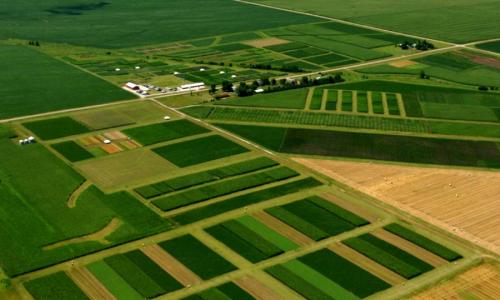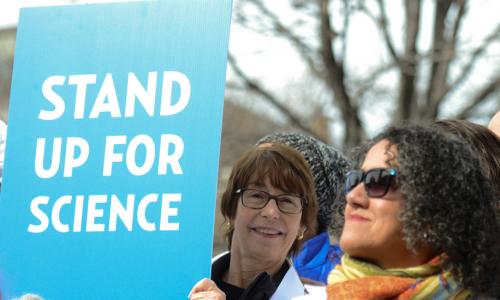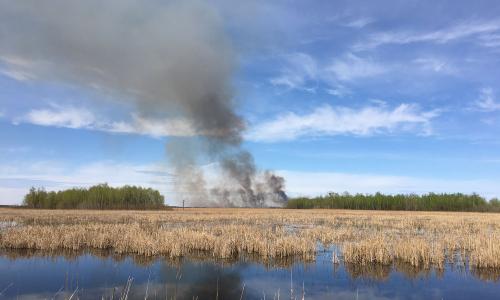A distinguished group of scientists and experts from universities and colleges across the United States—including land-grant universities in agricultural powerhouse states such as Iowa and California—has launched the following statement calling for increased public investment in agroecological research. The PDF version of the statement includes the full list of signers.
We support greater public investment in agricultural research that applies ecological principles and relies, to the greatest extent possible, on ecological processes ("agroecology") to address current and future farming challenges.
Agroecology regards farms as ecosystems embedded in broader landscapes and society. Agroecological approaches are based on understanding and managing ecological processes and biological functions to increase and sustain crop and livestock productivity, efficiently recycle inputs, and build soil fertility, while minimizing harmful impacts on soil, air, water, wildlife, and human health. Hallmarks of agroecological farming practices include increasing the types of crops rotated on fields from year to year; controlling pests and weeds with fewer chemical pesticides; enhancing soil health while reducing the need for synthetic fertilizers; and valuing non-cropped areas of farms for the services they provide.
Agroecology has a proven track record of meeting farming challenges in a cost-effective manner. Research has found that applying agroecological methods, like those detailed above, can result in high yields for each crop in a rotation sequence. In addition, long-term studies have found that organic practices—a specific set of agroecological practices that eschew the use of all synthetic chemical inputs—typically improve soil health compared to plots where conventional practices are applied, and may produce comparable yields. This research also demonstrated that economic returns for organic crops can be greater than for conventional crops, despite higher labor costs.
These findings indicate that additional research has the potential to increase our understanding of agroecological methods and increase their adoption. Farmers could benefit from this added knowledge to produce a wide range of crops in many different regions, with greater resilience to variation in pests, weather conditions, markets, and other factors.
While other approaches may also yield promising solutions, they are more likely to already benefit from private sector support. Agroecology is less likely to be supported by the private sector since these farming methods often reduce requirements for purchased inputs. This leaves to the public sector the responsibility to fund agroecological research that serves the interests of farmers and society.
At present, however, public research into agroecology is drastically inadequate. Land-grant universities were once guided by their original missions to enhance understanding of agriculture that served the public interest. But these institutions have fallen victim to budget cuts that have driven them to rely upon private dollars to fund research, leveraging public investment largely for the benefit of the private sector. And past analyses have found that funding for agroecology is a very small part of the federal research budget.
Agroecological research can further our understanding of productive and profitable farming methods that will minimize harmful impacts on human health, the environment, and rural communities. These methods will provide resilience to both anticipated events such as climate change as well as unforeseen developments. Modest public investment can yield enormous returns for farmers and society well into the future.
Signed,
Patricia Allen, Ph.D., Chair, Food Systems and Society, Marylhurst University
Miguel Altieri, Ph.D., Professor of Environmental Science, Policy and Management, University of California, Berkeley
Molly D. Anderson, Ph.D., Partridge Chair, Food & Sustainable Agriculture Systems, College of the Atlantic
J. Gordon Arbuckle, Jr., Ph.D., Associate Professor, Sociology, Iowa State University
George Bird, Ph.D., Professor Emeritus, Department of Entomology, Michigan State University
Nancy Creamer, Ph.D., Director, Center for Environmental Farming Systems, Distinguished Professor of Sustainable Agriculture and Community Based Food Systems, North Carolina State University
Carolyn Dimitri, Ph.D., Associate Professor, Department of Nutrition, Food Studies and Public Health, New York University
Mike Duffy, Ph.D., Professor of Economics, Iowa State University
Rick Foster, Ph.D., W. K. Kellogg Chair in Food, Society, and Sustainability, Michigan State University
Chuck Francis, Ph.D., Professor of Agronomy and Horticulture, University of Nebraska-Lincoln
Ryan E. Galt, Ph.D., Associate Professor, Department of Human Ecology, University of California, Davis
Stephen R. Gliessman, Ph.D., Professor Emeritus of Agroecology, University of California, Santa Cruz
Michael W. Hamm, Ph.D., C.S. Mott Professor of Sustainable Agriculture, Director, Center for Regional Food Systems, Michigan State University
Casey Hoy, Ph.D., Kellogg Endowed Chair in Agricultural Ecosystems Management, Professor of Entomology, Ohio State University
Alastair Iles, Assistant Professor of Environmental Science, Policy and Management, Faculty Co-Director, Berkeley Food Institute, University of California, Berkeley
Nicholas Jordan, Ph.D., Professor of Agroecology, University of Minnesota
Tom Kelly, Ph.D., Director, UNH Sustainability Institute, University of New Hampshire
Fred Kirschenmann, Ph.D., Distinguished Fellow, Leopold Center for Sustainable Agriculture, Iowa State University
Claire Kremen, Ph.D., Professor, Environmental Science, Policy and Managemen, Faculty Co-Director, Berkeley Food Institute, University of California, Berkeley
Matt Liebman, Ph.D., H. A. Wallace Endowed Chair for Sustainable Agriculture, Professor of Agronomy, Iowa State University
Albie Miles, Ph.D., Assistant Professor of Sustainable Community Food Systems, University of Hawai'i, West O'ahu
Bruce T. Milne, Ph.D., W. K. Kellogg Endowed Chair in Sustainable Environmental Systems, Professor of Biology, University of New Mexico
Helene Murray, Ph.D., Executive Director, Minnesota Institute for Sustainable Agriculture, University of Minnesota
Gary Paul Nabhan, Ph.D., W. K. Kellogg Endowed Chair in Sustainable Food Systems, Professor of Biology, University of Arizona
John O’Sullivan, Ph.D., W. K. Kellogg Endowed Chair in Sustainable Agriculture, Local and Community Food Systems, Director of Center for Environmental Farming Systems, North Carolina A&T State University
Bob Parsons, Ph.D., Professor, Department of Community Development and Applied Economics, University of Vermont
Christine M. Porter, Ph.D., Assistant Professor of Public Health, Food Dignity Project Director and Principal Investigator, University of Wyoming
DeAnn R. Presley, Ph.D., Associate Professor, Agronomy, Kansas State University
Mark Rasmussen, Ph.D., Director, Leopold Center for Sustainable Agriculture, Iowa State University
Lisa Schulte Moore, Ph.D., Associate Professor of Natural Resource Ecology and Management, Iowa State University
Kate M. Scow, Ph.D., Professor of Soil Science and Microbial Ecology, University of California, Davis
Dawn Thilmany, Ph.D., Professor, Agricultural and Resource Economics, Colorado State University
Paul Thompson, Ph.D., W. K. Kellogg Chair in Agricultural Food, and Community Ethics, Michigan State University
L. Ann Thrupp, Ph.D., Executive Director, Berkeley Food Institute, University of California, Berkeley
Thomas P. Tomich, Ph.D., W. K. Kellogg Endowed Chair in Sustainable Food Systems, Founding Director, Agricultural Sustainability Institute, University of California, Davis
Mary Wiedenhoeft, Ph.D., Professor of Agronomy, Iowa State University




